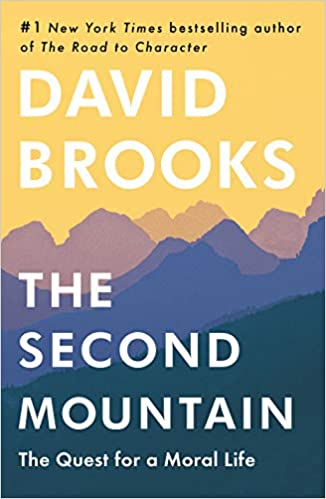Second Mountain Pastoring

In his book Second Mountain: The Quest for a Moral Life, David Brooks says that life seems to have a two-mountain shape.

The First Mountain
On the first mountain, we get out of school, begin a career, perhaps start a family, and establish an identity. “People climbing that first mountain spend a lot of time thinking about reputation management. They are always keeping score. How do I measure up? Where do I rank? … The goals on that first mountain are the normal goals that our culture endorses—to be a success, to be well thought of, to get invited into the right social circles, and to experience personal happiness. It’s all the normal stuff: nice home, nice family, nice vacations, good food, good friends, and so on.”
Eventually we’re left thinking that there must be more. We fail, or get hit by tragedy, and find ourselves in the valley, broken. Some stay there.
The Second Mountain
But others rebel against their former quest for prominence, pleasure, and success, as well as mainstream culture, and become other-centered. They start to climb the second mountain. They may or may not stay in the same careers, but they’re transformed. “It’s not about self anymore; it’s about a summons.”
“You don’t climb the second mountain the way you climb the first mountain. You conquer your first mountain. You identify the summit, and you claw your way toward it. You are conquered by your second mountain. You surrender to some summons, and you do everything necessary to answer the call and address the problem or injustice that is in front of you. On the first mountain you tend to be ambitious, strategic, and independent. On the second mountain you tend to be relational, intimate, and relentless.”
On the second mountain, you find your life by losing it.
Pastoring on the Second Mountain
I’ve pastored on both mountains.
Don’t get me wrong. Nobody belongs in pastoral ministry who’s in it for themselves. The call to eldership is a call to “shepherd the flock of God that is among you, exercising oversight, not under compulsion, but willingly, as God would have you; not for shameful gain, but eagerly; not domineering over those in your charge, but being examples to the flock” (1 Peter 5:2-3). It’s a call to lay down our lives in service.
But we’re full of mixed motives. I know I’ve spent time wondering if I’m measuring up, keeping score, focused on me as well as my calling.
Something happens, though, when you get knocked off that mountain. You pastor differently once you’ve been broken, when you show up not so much to conquer but as one who’s been conquered. There’s a peace in second-mountain pastoring that you don’t think exists on the first mountain. It’s less impressive, but way more meaningful and impactful.
I don’t really claim to be a second-mountain pastor. But I’ve visited there, and I want to spend more of my time there. I mainly recognize it in others. Their ministries feel different, and I’m not even sure they know it. But we do.
If you feel broken, don’t despair. You could be on the verge of entering second mountain ministry. You won’t want to go back.






